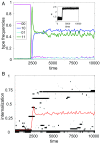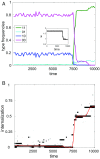Collective action and the evolution of social norm internalization - PubMed (original) (raw)
Collective action and the evolution of social norm internalization
Sergey Gavrilets et al. Proc Natl Acad Sci U S A. 2017.
Abstract
Human behavior is strongly affected by culturally transmitted norms and values. Certain norms are internalized (i.e., acting according to a norm becomes an end in itself rather than merely a tool in achieving certain goals or avoiding social sanctions). Humans' capacity to internalize norms likely evolved in our ancestors to simplify solving certain challenges-including social ones. Here we study theoretically the evolutionary origins of the capacity to internalize norms. In our models, individuals can choose to participate in collective actions as well as punish free riders. In making their decisions, individuals attempt to maximize a utility function in which normative values are initially irrelevant but play an increasingly important role if the ability to internalize norms emerges. Using agent-based simulations, we show that norm internalization evolves under a wide range of conditions so that cooperation becomes "instinctive." Norm internalization evolves much more easily and has much larger effects on behavior if groups promote peer punishment of free riders. Promoting only participation in collective actions is not effective. Typically, intermediate levels of norm internalization are most frequent but there are also cases with relatively small frequencies of "oversocialized" individuals willing to make extreme sacrifices for their groups no matter material costs, as well as "undersocialized" individuals completely immune to social norms. Evolving the ability to internalize norms was likely a crucial step on the path to large-scale human cooperation.
Keywords: conflict; cooperation; evolution; modeling; values.
Conflict of interest statement
The authors declare no conflict of interest.
Figures
Fig. 1.
Examples of evolutionary dynamics. Us-vs.-nature game with n=16,b= 4,vx= 0,vy= 0.5,X0= 8,δ= 0.50,K= 4. (A) Frequencies of individuals using different combinations of strategies (x,y). (Inset) The average fitness. (B) The dynamics of the distribution of the internalization trait η. The intensity of the black color is proportional to the number of individuals with the corresponding trait values present at a given time. The red line shows the mean value of η. See Methods and SI Appendix for exact definitions of parameters.
Fig. 2.
Examples of evolutionary dynamics: us-vs.-them game with n=8,b= 1,vx= 0,vy= 0.5,δ= 0.50,K= 2. (A) Frequencies of individuals using different combinations of strategies (x,y). (Inset) The average fitness. (B) The dynamics of the distribution of the internalization trait η. The intensity of the black color is proportional to the number of individuals with the corresponding trait values present at a given time. The red line shows the mean value of η. See Methods and the SI Appendix for exact definitions of parameters.
Fig. 3.
Summary graphs for us-vs.-nature games: efforts x, punishment y, internalization η, fitness w, and SD σ in internalization trait η for different normative values of production vx and punishment vy, and group size n. Other parameters: X0=n/2,δ= 0.5,b= 4,K= 3. Shown are averages based on 10 runs for each parameter combination.
Fig. 4.
Summary graphs for us-vs.-them games: efforts x, punishment y, internalization η, fitness w, and SD σ in internalization trait η for different normative values of production vx and punishment vy, and group size n. Other parameters: δ= 0.5,b= 1,K= 3. Shown are averages based on 10 runs for each parameter combination.
Similar articles
- The hitchhiker's guide to altruism: gene-culture coevolution, and the internalization of norms.
Gintis H. Gintis H. J Theor Biol. 2003 Feb 21;220(4):407-18. doi: 10.1006/jtbi.2003.3104. J Theor Biol. 2003. PMID: 12623279 - Normative foundations of human cooperation.
Fehr E, Schurtenberger I. Fehr E, et al. Nat Hum Behav. 2018 Jul;2(7):458-468. doi: 10.1038/s41562-018-0385-5. Nat Hum Behav. 2018. PMID: 31097815 Review. - Altruistic punishment does not increase with the severity of norm violations in the field.
Balafoutas L, Nikiforakis N, Rockenbach B. Balafoutas L, et al. Nat Commun. 2016 Nov 1;7:13327. doi: 10.1038/ncomms13327. Nat Commun. 2016. PMID: 27802261 Free PMC article. - Punishment leads to cooperative behavior in structured societies.
Shutters ST. Shutters ST. Evol Comput. 2012 Summer;20(2):301-19. doi: 10.1162/EVCO_a_00062. Epub 2012 Feb 24. Evol Comput. 2012. PMID: 22171813 - Cross-societal variation in norm enforcement systems.
Molho C, De Petrillo F, Garfield ZH, Slewe S. Molho C, et al. Philos Trans R Soc Lond B Biol Sci. 2024 Mar 11;379(1897):20230034. doi: 10.1098/rstb.2023.0034. Epub 2024 Jan 22. Philos Trans R Soc Lond B Biol Sci. 2024. PMID: 38244602 Free PMC article. Review.
Cited by
- False beliefs can bootstrap cooperative communities through social norms.
Morsky B, Akçay E. Morsky B, et al. Evol Hum Sci. 2021 Jun 14;3:e36. doi: 10.1017/ehs.2021.30. eCollection 2021. Evol Hum Sci. 2021. PMID: 37588567 Free PMC article. - Behavioural flexibility and reputation formation.
McNamara JM, Barta Z. McNamara JM, et al. Proc Biol Sci. 2020 Nov 25;287(1939):20201758. doi: 10.1098/rspb.2020.1758. Epub 2020 Nov 18. Proc Biol Sci. 2020. PMID: 33203326 Free PMC article. - Assessing different historical pathways in the cultural evolution of economic development.
Flitton A, Currie TE. Flitton A, et al. Evol Hum Behav. 2022 Jan;43(1):71-82. doi: 10.1016/j.evolhumbehav.2021.11.001. Evol Hum Behav. 2022. PMID: 35110961 Free PMC article. - Oxytocin and the Punitive Hub-Dynamic Spread of Cooperation in Human Social Networks.
Li S, Ma S, Wang D, Zhang H, Li Y, Wang J, Li J, Zhang B, Gross J, De Dreu CKW, Wang WX, Ma Y. Li S, et al. J Neurosci. 2022 Jul 27;42(30):5930-5943. doi: 10.1523/JNEUROSCI.2303-21.2022. Epub 2022 Jun 27. J Neurosci. 2022. PMID: 35760532 Free PMC article. - Authority matters: propaganda and the coevolution of behaviour and attitudes.
Gavrilets S, Richerson PJ. Gavrilets S, et al. Evol Hum Sci. 2022 Oct 28;4:e51. doi: 10.1017/ehs.2022.48. eCollection 2022. Evol Hum Sci. 2022. PMID: 37588907 Free PMC article.
References
- Wrong D. The oversocialized concept of man in modern sociology. Am Socio Rev. 1961;26:183–193.
- Granovetter M. Economic action and social structure: The problem of embeddedness. Am J Sociol. 1985;91:481–510.
- Richerson PJ, Boyd R. Not by Genes Alone: How Culture Transformed Human Evolution. Univ of Chicago Press; Chicago: 2005.
- Weber EU, Ames D, Blais AR. How do I choose thee? Let me count the ways: A textual analysis of similarities and differences in modes of decision making in China and the United States. Manag Organ Rev. 2005;1:87–118.
- Simpson B, Willer R. Beyond altruism: Sociological foundations of cooperation and prosocial behavior. Annu Rev Sociol. 2015;41:43–63.
Publication types
MeSH terms
LinkOut - more resources
Full Text Sources
Other Literature Sources



